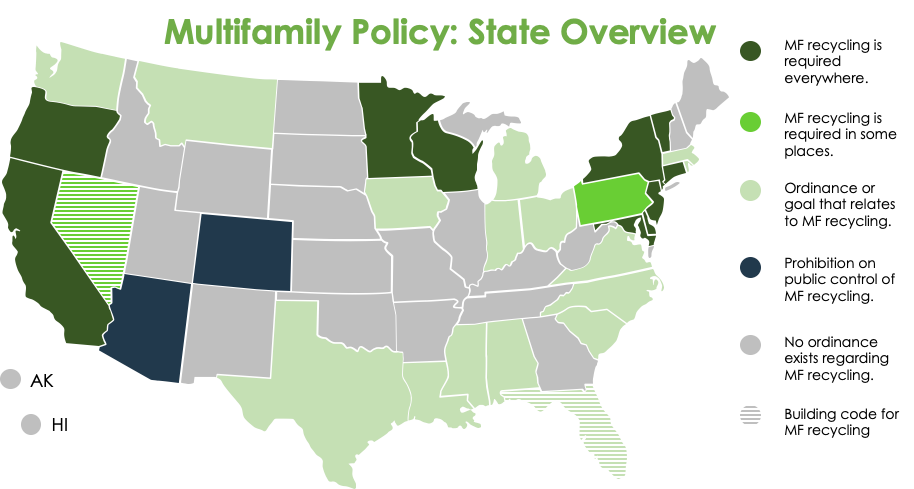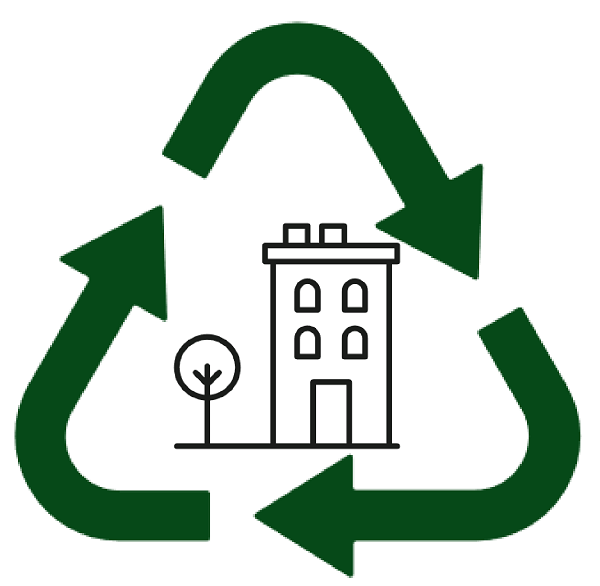Lily Schwartz is a fellow in the 2018 Leaders in Environment and Finance (LEAF) program. As part of the LEAF Fellowship, Lily spent the summer of 2018 working as a technical assistance intern for The Recycling Partnership, a nonprofit organization that leverages corporate partner funding to improve recycling in cities and counties across the United States. Lily helped The Recycling Partnership to assess the nation’s current landscape for multifamily recycling and examine policies for moving forward.
There are many examples where families living in multifamily properties, such as apartment buildings and condominiums, have different levels of access than residents of single-family homes to important environmental services and programs. In the past, the Environmental Finance Center at the University of North Carolina at Chapel Hill (EFC) has carried out applied research on a range of multifamily services, including access to energy efficiency programs and water bill assistance programs. Multifamily housing makes up nearly one-fifth of the total housing stock in the United States, with more than 20 million occupied housing units. In spite of this, a recent study found that less than 4 million people live in communities where recycling services are automatically provided to multifamily properties. Increasing access to convenient recycling services for multifamily residents can lead to environmental benefits by increasing resource recovery and reducing the water and air emission impacts of landfills and virgin material use. Better understanding current service practices and barriers to service expansion can help improve future service.
During the summer of 2018, a Leaders in Environment and Finance (LEAF) fellow from the EFC worked with The Recycling Partnership to assess the nation’s current landscape for multifamily recycling by conducting interviews with recycling programs leaders for all 50 states and 67 different municipalities.
A Snapshot: State Policies and Collection Logistics
The assessment found that access is influenced by decisions and policies at multiple levels ranging from state level policies and laws to decisions made by multifamily building owners and their residents. Out of the entire country, 15 states have enacted a statewide policy directly related to multifamily recycling. However, one-half of all states were found to have a statewide policy that indirectly relates to multifamily recycling access—for example, a total waste reduction goal or a landfill disposal ban on common recyclable materials. The following map displays statewide policies affecting multifamily recycling:

Most states did not engage with multifamily recycling beyond overseeing the implementation of statewide policy; six states offered technical assistance or educational resources targeted for multifamily recycling programs. No states offered recurring designated funding for multifamily recycling projects. However, 33 states did have a competitive grant program for which a multifamily recycling project could be eligible to receive funds.
A Snapshot: Municipal Policies and Collection Logistics
The assessment focused on large cities, but excluded the largest cities such as New York City, Los Angeles, Houston, etc. because their proportion of multifamily was so much greater than the rest of the country and their characteristics were suspected to be less applicable nationwide. Cities ranking between #26 and #126 in population size via the American Community Survey were selected for interviews. Of these 100 municipalities, 67 participated. Forty-five percent (30 cities) of the municipalities reported having a multifamily recycling ordinance. Eighty percent of these municipal ordinances were a result of compliance with state legislation. Of the six municipalities with ordinances that were not products of state legislation, three required that multifamily residents have access to recycling services. The other three required that property managers simply have the opportunity to provide recycling services to their residents if they choose to do so.
Most cities reported relying on an “open market” approach to multifamily recycling; in other words, property owners were free to contract with service providers of their choice. However, if there was an ordinance requiring that recycling services be available at multifamily properties, municipalities were likely to use their franchising and licensing authority to influence which haulers could operate.
The Future of Multifamily Recycling
Policies and practices for multifamily recycling vary across the United States. Nevertheless, conversations with cities and states revealed four common challenges:
- Constraints on property space
- Illegal dumping and contamination
- Insufficient on-site education
- Lack of support from property management
Despite the challenges to growing multifamily recycling, several state and municipal recycling program leaders indicated that they plan to focus efforts on improving multifamily recycling collection in the future. Organizations like The Recycling Partnership are devoted to assisting communities expand access to these services.
Lily Schwartz is an undergraduate at the University of North Carolina at Chapel Hill studying Public Policy and Environmental Studies (Sustainability Track) with a minor in Philosophy, Politics, & Economics. Prior to working with the EFC, Lily interned with the Orange County Solid Waste Management Department and served as co-President of the UNC-Chapel Hill Greek Sustainability Council.





Leave a Reply